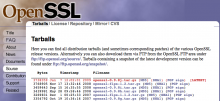Another day, another OpenSSL patch
The latest OpenSSL security hole isn't a bad one as these things go. It's no Heartbleed, Freak, or Logjam. But it's serious enough that, if you're running alpha or beta operating systems, you shouldn't delay patching it.
Fortunately, the affected OpenSSL versions are not commonly used in enterprise operating systems. For example, it doesn't impact shipping and supported versions of Red Hat Enterprise Linux (RHEL) or Ubuntu. In the case of Ubuntu, it does affect the 15.10 development release, but the patch is already available.









































































